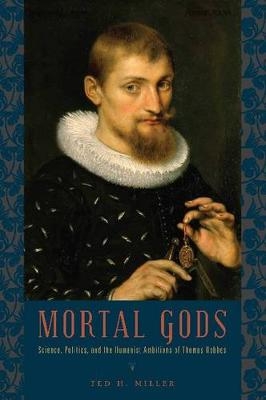
Mortal Gods
Science, Politics, and the Humanist Ambitions of Thomas Hobbes
Seiten
2011
Pennsylvania State University Press (Verlag)
978-0-271-04891-8 (ISBN)
Pennsylvania State University Press (Verlag)
978-0-271-04891-8 (ISBN)
- Titel z.Zt. nicht lieferbar
- Versandkostenfrei innerhalb Deutschlands
- Auch auf Rechnung
- Verfügbarkeit in der Filiale vor Ort prüfen
- Artikel merken
Argues against the accepted idea that Thomas Hobbes turned away from humanism to pursue the scientific study of politics. Reconceptualizes Hobbes's thought within early modern humanist pedagogy and the court culture of the Stuart regimes.
According to the commonly accepted view, Thomas Hobbes began his intellectual career as a humanist, but his discovery, in midlife, of the wonders of geometry initiated a critical transition from humanism to the scientific study of politics. In Mortal Gods, Ted Miller radically revises this view, arguing that Hobbes never ceased to be a humanist. While previous scholars have made the case for Hobbes as humanist by looking to his use of rhetoric, Miller rejects the humanism/mathematics dichotomy altogether and shows us the humanist face of Hobbes’s affinity for mathematical learning and practice. He thus reconnects Hobbes with the humanists who admired and cultivated mathematical learning—and with the material fruits of Great Britain’s mathematical practitioners. The result is a fundamental recasting of Hobbes’s project, a recontextualization of his thought within early modern humanist pedagogy and the court culture of the Stuart regimes. Mortal Gods stands as a new challenge to contemporary political theory and its settled narratives concerning politics, rationality, and violence.
According to the commonly accepted view, Thomas Hobbes began his intellectual career as a humanist, but his discovery, in midlife, of the wonders of geometry initiated a critical transition from humanism to the scientific study of politics. In Mortal Gods, Ted Miller radically revises this view, arguing that Hobbes never ceased to be a humanist. While previous scholars have made the case for Hobbes as humanist by looking to his use of rhetoric, Miller rejects the humanism/mathematics dichotomy altogether and shows us the humanist face of Hobbes’s affinity for mathematical learning and practice. He thus reconnects Hobbes with the humanists who admired and cultivated mathematical learning—and with the material fruits of Great Britain’s mathematical practitioners. The result is a fundamental recasting of Hobbes’s project, a recontextualization of his thought within early modern humanist pedagogy and the court culture of the Stuart regimes. Mortal Gods stands as a new challenge to contemporary political theory and its settled narratives concerning politics, rationality, and violence.
Ted H. Miller is Associate Professor of Political Science at the University of Alabama.
Contents
Acknowledgments
1Introduction
2The Humanist Face of Hobbes’s Mathematics, Part 1
3Constraints That Enable the Imitation of God
4King of the Children of Pride: The Imitation of God in Context
5Architectonic Ambitions: Mathematics and the Demotion of Physics
6Eloquence and the Audience Thesis
7All Other Doctrines Exploded: Hobbes, History, and the Struggle over Teaching
8The Humanist Face of Hobbes’s Mathematics, Part 2: Leviathan and the Making of a Masque-Text
9Conclusion
Appendix: Who Is a Geometer?
Notes
Bibliography
Index
| Zusatzinfo | 4 Halftones, black and white |
|---|---|
| Verlagsort | Pennsylvania |
| Sprache | englisch |
| Maße | 152 x 229 mm |
| Gewicht | 635 g |
| Themenwelt | Geisteswissenschaften ► Philosophie ► Philosophie der Neuzeit |
| ISBN-10 | 0-271-04891-3 / 0271048913 |
| ISBN-13 | 978-0-271-04891-8 / 9780271048918 |
| Zustand | Neuware |
| Haben Sie eine Frage zum Produkt? |
Mehr entdecken
aus dem Bereich
aus dem Bereich


